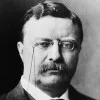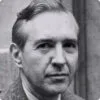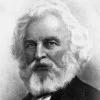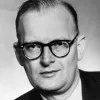Let the man of learning, the man of lettered leisure, beware of that queer and cheap temptation to pose to himself and to others as the cynic, as the man who has outgrown emotions and beliefs, the man to whom good and evil are as one. The poorest way to face life is to face it with a sneer.
Theodore Roosevelt (1858-1919) American politician, statesman, conservationist, writer, US President (1901-1909)
Speech (1910-04-23), “Citizenship in a Republic [The Man in the Arena],” Sorbonne, Paris
(Source)
Quotations about:
sophistication
Note not all quotations have been tagged, so Search may find additional quotes on this topic.
The greatest artists have never been men of taste. By never sophisticating their instincts they have never lost the awareness of the great simplicities, which they relish both from appetite and from the challenge these offer to skill in competition with popular art.
Jacques Barzun (1907-2012) French-American historian, educator, polymath
Essay (1956), “Whirligig: Last Words on Berlioz,” The Energies of Art: Studies of Authors Classic and Modern,
(Source)
Update of an earlier, uncited essay.
French food, by the way, isn’t fancy unless, like other cooking, it wants to be fancy; perhaps it sounds so because it is in a foreign language, but a Coq au Vin is a chicken stew, a Pot-au-feu is a boiled dinner, a Mayonnaise de Volaille is a chicken salad, Soubise is plain old rice cooked with onions, and there is nothing fancy about any of them.
Julia Child (1912-2004) American chef and writer
Julia Child’s Kitchen, Introduction (1975)
(Source)
Education is more than information, or skill, or propaganda. In each age education must take into account the conditions of that age. But the educated mind is not a mere creature of its own time. Education is emancipation from herd opinion, self-mastery, capacity for self-criticism, suspended judgment, and urbanity.
Everett Dean Martin (1880-1941) American educator, minister, writer, lecturer
The Meaning of a Liberal Education, Preface (1926)
(Source)
No human society is too primitive to have some kind of literature. The only thing is that primitive literature hasn’t yet become distinguished from other aspects of life: it’s still embedded in religion, magic and social ceremonies.
Northrop Frye (1912-1991) Canadian literary critic and literary theorist
The Educated Imagination, Talk 2 “The Singing School” (1963)
(Source)
Charming villains have always had a decided social advantage over well-meaning people who chew with their mouths open.
Judith Martin (b. 1938) American author, journalist, etiquette expert [a.k.a. Miss Manners]
Common Courtesy, “In the Quest for Equality, Civilization Itself Is Maligned” (1985)
(Source)
Originally published in The New Republic in 1984.
With many readers, brilliancy of style passes for affluence of thought; they mistake buttercups in the grass for immeasurable gold mines under the ground.
When I was a child, I used to talk like a child, and think like a child, and argue like a child, but now I am a man, all childish ways are put behind me.
[Ὅτε ἤμην νήπιος ἐλάλουν ὡς νήπιος ἐφρόνουν ὡς νήπιος ἐλογιζόμην ὡς νήπιος ὅτε γέγονα ἀνήρ κατήργηκα τὰ τοῦ νηπίου.]
The Bible (The New Testament) (AD 1st - 2nd C) Christian sacred scripture
1 Corinthians 13:11 [JB (1966)]
(Source)
(Source (Greek)). Alternate translations:When I was a child, I spake as a child, I understood as a child, I thought as a child: but when I became a man, I put away childish things.
[KJV (1611)]When I was a child, my speech, feelings, and thinking were all those of a child; now that I am an adult, I have no more use for childish ways.
[GNT (1976)]When I was a child, I used to talk like a child, and see things as a child does, and think like a child; but now that I have become an adult, I have finished with all childish ways.
[NJB (1985)]When I was a child, I used to speak like a child, reason like a child, think like a child. But now that I have become a man, I’ve put an end to childish things.
[CEB (2011)]When I was a child, I spoke like a child, I thought like a child, I reasoned like a child. When I became an adult, I put an end to childish ways.
[NRSV (2021 ed.)]
Detective inspector John “Call me Jack, everyone does” Robinson did not like theatres. Bit of a night out at the variety or even the Tiv was fair enough, but ever since a high-minded relative had forced him to sit through an Ibsen festival at an impressionable age, theatres had always been synonymous with what he called ‘high art’, a portmanteau term for everything self-indulgent, terminally tedious and incomprehensible in the world of culture.
Any sufficiently advanced magic is indistinguishable from technology.
Charles "Charlie" Stross (b. 1964) British writer
The Nightmare Stacks, ch. 18 (2016)
(Source)
A variant of Clarke's Third Law.
Call me a “rube” and a “hick,” but I’d a lot rather be the man who bought the Brooklyn Bridge than the man who sold it.
PETER: (baldly) You see, Wendy, when the first baby laughed for the first time, the laugh broke into a thousand pieces and they all went skipping about, and that was the beginning of fairies. And now when every new baby is born its first laugh becomes a fairy. So there ought to be one fairy for every boy or girl.
WENDY (breathlessly). Ought to be? Isn’t there?
PETER. Oh no. Children know such a lot now. Soon they don’t believe in fairies, and every time a child says ‘I don’t believe in fairies’ there is a fairy somewhere that falls down dead. (He skips about heartlessly.)
J. M. Barrie (1860-1937) Scottish novelist and dramatist [James Matthew Barrie]
Peter Pan, Act 1 (1904, pub. 1928)
(Source)
In Barrie's novelization, Peter and Wendy, ch. 3 "Come Away, Come Away!" (1911), this is rendered:“You see, Wendy, when the first baby laughed for the first time, its laugh broke into a thousand pieces, and they all went skipping about, and that was the beginning of fairies.”
Tedious talk this, but being a stay-at-home she liked it.
“And so,” he went on good-naturedly, “there ought to be one fairy for every boy and girl.”
“Ought to be? Isn’t there?”
“No. You see children know such a lot now, they soon don’t believe in fairies, and every time a child says, ‘I don’t believe in fairies,’ there is a fairy somewhere that falls down dead.”
Once we had wooden chalices and golden priests, now we have golden chalices and wooden priests.
Ralph Waldo Emerson (1803-1882) American essayist, lecturer, poet
“The Preacher,” lecture, Cambridge (1879-05-05)
(Source)
The function of the expert is not to be more right than other people, but to be wrong for more sophisticated reasons.
David Butler (b. 1924) British social scientist, psephologist
The Observer (1969)















